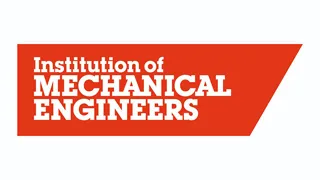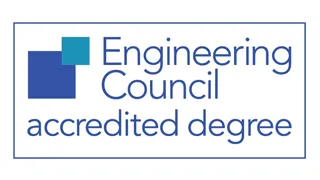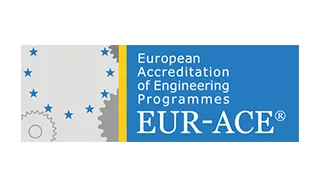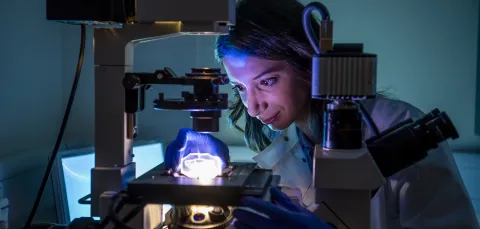About this course
Combine biology and medicine with engineering on our MSc Biomedical Engineering degree. Study human biology in your chosen specialist area and learn the skills to develop new engineering solutions. Prepare to take on a leading role in helping healthcare practitioners and providers to improve and maintain people's health.
This UK master’s degree is ideal if you're an engineering, mathematics or physical science graduate who wants to specialise in Biomedical Engineering or support your continued professional development.
Biomedical engineers work in the fields of engineering, biology and medicine to solve medical and healthcare challenges facing society. This work helps to create medical procedures, imaging systems, and devices for observing and controlling body functions.
A range of optional modules are available, from materials engineering to biological-inspired robotics. We also offer 5 pathways for those who wish to specialise:
- musculoskeletal
- cardiovascular
- imaging
- diagnostic systems
- audiology
You'll study with teams of physicians, scientists, engineers, business people and other professionals. In this environment you’ll learn to monitor, restore and enhance normal body function, abilities and outcomes. You’ll also develop and evaluate products such as artificial organs, prostheses and instruments.
Throughout your studies you’ll improve your understanding of the ethical, safety and societal implications of developing medical technologies.
This course draws on expertise from leading departments within the University of Southampton, brought together through the:
- Institute for Life Sciences
- Engineering and the Environment
- Medicine
- Health Sciences
- Natural and Environmental Sciences
- Electronics and Computer Science
We regularly review our courses to ensure and improve quality. This course may be revised as a result of this. Any revision will be balanced against the requirement that the student should receive the educational service expected. Find out why, when, and how we might make changes.
Our courses are regulated in England by the Office for Students (OfS).
Course lead
Dr Richard Cook is the course lead. Find out more on Dr Richard staff profile page.
Accreditations
This master's programme is accredited by the Institution of Mechanical Engineers (IMechE) as meeting the academic requirement for Further Learning, for Chartered Engineer registration. Candidates must hold a BEng/BSc undergraduate first degree that is accredited for Chartered Engineer (CEng) registration to comply with full CEng registration requirements.

Institution of Mechanical Engineers (IMechE)

Engineering Council

European Accreditation of Engineering Programmes (EAEP)
Learn more about this subject area
Course location
This course is based at Highfield.
Awarding body
This qualification is awarded by the University of Southampton.
Download the Course Description Document
The Course Description Document details your course overview, your course structure and how your course is taught and assessed.
Entry requirements
You’ll need a 2:1 degree in one of the following subjects:
- biomedical engineering
- mechanical engineering
- physics
- maths
- bioengineering
- aerospace engineering
- automotive engineering
- engineering materials
- mechatronics
- electrical engineering
- electronics engineering
You'll also need a 2:1 in at least one advanced mathematics module.
We will also consider applicants with undergraduate degrees in audiology.
Find the equivalent international qualifications for your country.
Information for students who have studied in China
This programme only accepts applicants who have studied at a Tier A, B or C institution.
English language requirements
If English is not your first language, you must show that you can use English to the level we require. Visit our English language pages to find out which qualifications we accept and how you can meet our requirements.
If you are taking the International English Language Testing System (IELTS), you must get at least the following scores:
IELTS score requirements
- overall score
- 6.5
- reading
- 6.0
- writing
- 6.0
- speaking
- 6.0
- listening
- 6.0
If you do not meet the English language requirements through a test or qualification, you may be able to meet them by completing one of our pre-sessional English programmes before you start your course.
Pre-masters
If you don’t meet direct entry requirements, you can apply to complete a Pre-Master's programme through our partnership with OnCampus.
You'll progress to your chosen course after successfully completing the programme. Find out more about Pre-Master's programmes for international students.
Recognition of professional experience
If you don't have the exact entry requirements, but you have significant work experience in this sector we’ll assess your relevant professional experience, your subject knowledge and your aptitude for learning.
Your application will be considered on individual merit and you may be asked to attend an interview.
Got a question?
Please contact us if you're not sure you have the right experience or qualifications to get onto this course.
Email: enquiries@southampton.ac.uk
Tel: +44(0)23 8059 5000
Course structure
On this biomedical engineering master’s you’ll study compulsory modules across two 12-week semesters. At the end of each semester you'll take exams.
You’ll also choose from optional modules in both semesters, allowing you to focus on your preferred specialism.
The final 4 months of the course are spent full time on your research project where you’ll combine engineering skills with an understanding of the complexity of biological systems. Example research projects include:
- the design and performance evaluation of new devices to replace joints
- the development of new imaging methods to study bone or lung diseases
Your research project must contain your own ideas and proposals. It should represent a problem with a new element that requires the application of new information and concepts.
Want more detail? See all the modules in the course.
Modules
The modules outlined provide examples of what you can expect to learn on this degree course based on recent academic teaching. As a research-led University, we undertake a continuous review of our course to ensure quality enhancement and to manage our resources. The precise modules available to you in future years may vary depending on staff availability and research interests, new topics of study, timetabling and student demand. Find out why, when and how we might make changes.
For entry in academic year 2026 to 2027
Year 1 modules
You must study the following modules :
Human Biology & Systems Physiology
In Biomedical Engineering, it is essential to develop an in-depth understanding of human biology, anatomy and physiology, so that engineering expertise can be meaningfully applied to problems in human healthcare and disease as well as degeneration within ...
Introduction to Biomedical Engineering
Biomedical Engineering is an exciting and multidisciplinary field that combines expertise in a wide range of engineering techniques, anatomy and physiology, medicine, healthcare and the personal and societal context in which patients and their carers live...
MSc Research Project
Within the context of your programme of study, students will undertake independent, original and critical research on a relevant topic. Students will then communicate the research objectives, methodology, analysis, results and conclusions effectively both...
Translational Medicine
The Translational Medicine module gives an overview of the regulatory, ethical and practical requirements of translating novel devices, processes, engineering or software solutions into a clinical setting. The use of pre-clinical models and the UK regulat...
You must also choose from the following modules :
Active Control of Sound and Vibration
This aim of this module is to build an understanding of the physics of active control. Active control is a method for realising control through the use of secondary sources or actuation, whose outputs are designed to modify the response of a system. Techn...
Advanced Computational Methods I
The module is focussed around advanced computational methods incorporating C and compiled languages, computational modelling and software engineering techniques for science and engineering. It builds on lower level courses such as FEEG1001 and FEEG2001 an...
Advanced Electrical Systems
To provide an introduction to power system analysis and power electronics, and an in-depth coverage of electrical machine operation and design in the context of applications from the fields of renewable energy, marine propulsion, robotics and electric veh...
Advanced Finite Element Analysis
This module is aimed at providing exposure to and understanding of advanced, specialist areas of Finite Element Analysis and their underlying Solid/Structural Mechanics concepts. It then concentrates on using this knowledge for solving discipline-specifi...
Advanced Sensors and Condition Monitoring
This module explores from traditional conditioning monitoring of machinery to biomechanical systems (i.e. sensors to monitor body forces and motions). It covers condition monitoring strategies, including international standards, monitoring procedures and...
Biological Materials and Biomedical Devices
This module provides an introduction to the ways in which engineering methods are used in characterising and modelling the biophysical properties of tissues and organs, and applied to the design of biomedical implants and devices for the treatment of a wi...
Biomaterials
A biomaterial can be described as a material used in a biomedical device intended to interact with biological systems. The selection of an appropriate biomaterial is critical to the performance of an implant. For a hip replacement, properties such as good...
Biomedical Application of Signal and Image Processing
During the process of diagnosis and subsequent treatment, patients routinely undergo imaging, measurement and monitoring procedures using a wide range of techniques. Whether it is the automated monitoring of blood pressure of flow, the electrical signals ...
Biomedical Spectroscopy and Imaging
Biomedical research, applications and many clinical tools are underpinned by modern spectroscopic and imaging techniques. These serve as valuable analytical tools for routine monitoring, diagnosis and prognosis as well as aids to therapeutic intervention ...
Computational methods in biomedical engineering design
Computational methods play an ever increasing role for the successful development of cost-effective and robust engineering solutions to address the challenges emerging from a healthcare agenda calling for prolonging independent living and the personalisat...
Control and Instrumentation
This module covers topics in classical and modern control analysis and design with a focus on linear time invariant systems. Fundamental design and analysis in the time and frequency domain are reviewed and developed. The properties of discrete-time syste...
Design Search and Optimisation (DSO) - Principles, Methods, Parameterizations and Case Studies
This module introduces students to formal design search and optimization (DSO) approaches using a mixture of lectures covering theory and practice and a series of worked case studies with student participation.
Failure of Materials and Components
In this module, the emphasis moves away from alloy development and design, and focuses on the performance of structural materials in a range of engineering applications. The lectures draw on examples from applications of ceramics, steel, Al, Ti and Ni bas...
Finite Element Analysis in Solid Mechanics
Many real-world engineering structures are too complex for their behaviour to be understood using an ‘exact’ analytical or theoretical method alone. Therefore, in practice we often use approximate numerical or simulation-based tools for structural analysi...
Fundamentals of Auditory Implants
The aim of the module is to provide an overview of the core scientific and clinical aspects of auditory implantation. This module is primarily for those taking one of our audiology programmes or taking the module as 'stand-alone' as part of career develo...
Heat Transfer and Applications
This module gives a comprehensive coverage of the classical heat transfer syllables, including steady and transient heat conduction, convection and radiation. While the underlying mathematics are properly elaborated, their conceptual significance and phys...
Human Factors in Engineering
This module provides an introduction to the role human factors in Engineering. It demonstrates how the characteristics and capabilities of people can be taken into account to optimise the design of things used by people, the environments in which they li...
Human Responses to Sound and Vibration
This module provides an understanding of human responses to sound and vibration in the environment, and how such environmental stimuli are measured and assessed. People judge the success or failure of any efforts in noise and vibration control, so their r...
Image Processing
This module is useful to introduce: - Image processing and its relation to signal processing. - Image transformations for filtering, coding and etc. - Histogram processing algorithms to enhance image qualities and visibility. - Theories analysing and ...
Manufacturing and Materials
This module manufacturing and materials is intended to develop a deeper understanding of the relationship between design, manufacturing processing and materials properties. This module discusses various manufacturing methods including casting, forming, we...
Medical Electrical and Electronic Technologies
This module aims to provide an in-depth understanding, appropriate to an engineer, of medical technologies for clinical applications and an understanding of the electrical hazards to human health.
Numerical Methods
Often in mathematics, it is possible to prove the existence of a solution to a given problem, but it is not possible to "find it". For example, there are general theorems to prove the existence and uniqueness of an initial value problem for an ordinary di...
Orthopaedic Biomechanics
This module will provide an insight into the engineering based problems faced in orthopaedic biomechanics, through a detailed study of intact lower limb and the lower limb pre- and post- total joint replacement. You will gain an understanding of the struc...
Physiology and Psychology of Hearing
The sense of hearing is essential for human communication. In this module we investigate the extraordinary capabilities and limitations of the human sense of hearing. Starting with the outer, middle and inner ear, we will investigate the anatomical and ph...
Rehabilitation of Auditory Disorders
The purpose of this module is to provide you with knowledge and understanding of the core concepts related to Adult Auditory Rehabilitation including principles of health psychology and signal processing as well as technical and psychosocial aspects of th...
Vestibular Audiology
This module provides an in-depth introduction to vestibular audiology, including the anatomy and physiology of the vestibular system within the wider contexts of the systems of eye movement and balance control, the vestibulo-ocular reflex, important patho...
Learning and assessment
Learning
To help you succeed as biomedical engineer, the course features:
- ‘problem-driven’ seminars
- site and hospital visits
- workshops and training sessions by experts from industry and national laboratories
You'll need to contribute your own professional experiences and thoughts to the learning of the whole class through a free exchange of ideas. You’ll gain an understanding of the limitations of current knowledge and the changing nature of technologies and society.
Your research project is intended to bring together the full range of skills in the course. while demonstrating in-depth knowledge and understanding of Biomedical Engineering. To prepare for it, we’ll teach you how to:
- gather and handle information
- critically analyse and evaluate evidence
- present your findings
Assessment
We’ll assess you through:
- your research project
- coursework, laboratory reports and essays
- a dissertation
- essays
- group essays
- individual and group projects
- written exams
Academic Support
You’ll get a personal tutor to help you with organisational and personal matters. A project supervisor will take over this role when your research project starts.
Careers and employability
Employability skills
This degree will allow you to develop and evidence subject-specific and targeted employability skills. This includes the required skill set for a range of future careers, further study, or starting your own business.
The skills you can expect to focus on and gain from this course include:
- Research
- Critical thinking
- Commercial awareness
- Self-management
- Confidence
- Communication
- Teamwork
- Creativity
- EDI leadership
- Adaptability
- Problem solving
- Resilience
The employability and enterprise skills you'll gain from this course are reflected in the Southampton skills model. When you join us you'll be able to use our skills model to track, plan, and benefit your career development and progress.
Download skills overview
Career pathways
Graduates commonly work in a range of organisations or sectors including:
Information and Communication,
Education,
Public Administration and Defence,
Scientific and Technical,
Manufacturing.
- Prosthetic device engineer
- Biomedical engineer
- Rehabilitation engineer
- Biomechanical engineer
- Biomaterials engineer
- Physiological modeller
- Research scientist
- University lecturer
- Management consultant
- Data analyst
- Financial analyst
- Science teacher
- Project manager
- Medical laboratory assistant
- Biomedical support worker
- Associate Practitioner
- Account executive
- Medical writer
- Biomedical engineer
- Secondary school teacher
- Data engineer
- Software engineer
- Research coordinator
Job prospects for MSc Biomedical Engineering graduates
*Example graduate job titles and job prospect statistics taken from The Graduate Outcomes Survey, which gathers information about the activities and perspectives of graduates 15 months after finishing their course.

Work experience opportunities
Choosing to do work experience is a great way to enhance your employability, build valuable networks, and evidence your potential. Learn about the different work and industry experience options at Southampton.
Careers services and support
We are a top 20 UK university for employability (QS Graduate Employability Rankings 2022). Our Careers, Employability and Student Enterprise team will support you. This support includes:
- work experience schemes
- CV and interview skills and workshops
- networking events
- careers fairs attended by top employers
- a wealth of volunteering opportunities
- study abroad and summer school opportunities
We have a vibrant entrepreneurship culture and our dedicated start-up supporter, Futureworlds, is open to every student.
Your career ideas and graduate job opportunities may change while you're at university. So it is important to take time to regularly reflect on your goals, speak to people in industry and seek advice and up-to-date information from Careers, Employability and Student Enterprise professionals at the University.
Fees, costs and funding
Tuition fees
Fees for a year's study:
- UK students pay £10,400.
- EU and international students pay £32,500.
Deposit
If you're an international student on a full-time course, we'll ask you to pay £2,000 of your tuition fees in advance, as a deposit.
Your offer letter will tell you when this should be paid and provide full terms and conditions.
Find out about exemptions, refunds and how to pay your deposit on our tuition fees for overseas students page.
What your fees pay for
Your tuition fee covers the full cost of tuition and any exams. The fee you pay will remain the same each year from when you start studying this course. This includes if you suspend and return.
Find out how to pay your tuition fees.
Accommodation and living costs, such as travel and food, are not included in your tuition fees. There may also be extra costs for retake and professional exams.
Explore:
10% alumni discount
If you’re a graduate of the University of Southampton, you could be eligible for a 10% discount on your postgraduate tuition fees.
Postgraduate Master’s Loans (UK nationals only)
This can help with course fees and living costs while you study a postgraduate master's course.
If you study part-time, you may not be eligible for this loan. Find out if you're eligible.
Funding your postgraduate studies
A variety of additional funding options may be available to help you pay for your master’s study. Both from the University and other organisations.
Funding for EU and international students
Find out about funding you could get as an international student.
How to apply
- Use the blue 'apply for this course' button on this page to take you to our postgraduate admissions system.
- Create an account which gives you access to your own application portal. .
- Search for the course you want to apply for.
- Complete the application form and upload any supporting documents.
- Submit your application.
For further details of our admission process, read our step by step guide to postgraduate taught applications.
Application deadlines
UK students
The deadline to apply for this course is Wednesday 2 September 2026, midday UK time.
We advise applying early as applications may close before the expected deadline if places are filled.
International students
The deadline to apply for this course is Wednesday 19 August 2026, midday UK time.
We advise applying early as applications may close before the expected deadline if places are filled.
Application assessment fee
There is no application assessment fee for postgraduate courses starting in 2026.
Supporting information
When you apply you’ll need to submit a personal statement explaining why you want to take the course.
You’ll need to include information about:
- your knowledge of the subject area
- why you want to study a postgraduate qualification in this course
- how you intend to use your qualification
References are not required for this programme.
Please include the required paperwork showing your first degree and your IELTS English language test score (if you are a non-native English speaker) with your application. Without these, your application may be delayed.
What happens after you apply
You'll be able to track your application through our online Applicant Record System.
We will aim to send you a decision 6 weeks after you have submitted your application.
If we offer you a place, you will need to accept the offer within 30 working days. If you do not meet this deadline, we will offer your place to another applicant.
Unfortunately, due to number of applications we receive, we may not be able to give you specific feedback on your application if you are unsuccessful.
Equality and diversity
We treat and select everyone in line with our Equality and Diversity Statement.
Got a question?
Please contact us if you're not sure you have the right experience or qualifications to get onto this course.
Email: enquiries@southampton.ac.uk
Tel: +44(0)23 8059 5000

